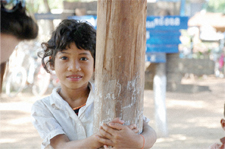Buddhist Global Relief began as a call to action by the American monk Ven. Bhikkhu Bodhi. Originally from New York, Bhikkhu Bodhi spent over 20 years in Sri Lanka, where he received monastic ordination in the Theravada school of Buddhism. He returned to the U.S. in 2002, and since 2007 has been living and teaching at Chuang Yen Monastery in Carmel, New York. In 2007, Ven. Bodhi wrote an essay for Buddhadharma: The Practitioner’s Quarterly, “A Challenge to Buddhists,” that offered a searing critique of the contemporary Western Buddhist attitude toward global suffering. “I know we engage in lofty meditations on kindness and compassion and espouse beautiful ideals of love and peace,” he said, “But note that we pursue them largely as inward, subjective experiences geared toward personal transformation. Too seldom does this type of compassion roll up its sleeves and step into the field.”
The call was heard. After reading his essay, several of Ven. Bodhi’s students decided to form a Buddhist relief organization dedicated to the alleviation of the suffering that occurs every day on every continent. As the organization took shape, its board came to include a former director of CARE, the CEO of a crisis center in Florida, and professionals in the fields of graphics design, computer technology, law, and accounting. Buddhist Global Relief (BGR) has emerged as an all-volunteer organization with projects conceived and implemented by a team of people who regard compassionate service as an important aspect of their dharma practice.
Kim Behan was just the person to help with the formation of BGR. A software engineer for 28 years, she was already doing service work in her native Vietnam before making the decision to retire and devote herself full-time to BGR’s mission.
“This is a powerful practice,” Behan says. “It is the work of the heart, a labor of love. We don’t expect anything in return, and yet, in the three years I’ve been here, I’ve seen how things come back.”
Today Behan is BGR’s executive director, helping make Ven. Bodhi’s vision a reality, turning compassion into action. Working almost full time, entirely on a voluntary basis, she takes as her only compensation the deep satisfaction she receives from her work. “This work is confirmation that this is the right path,” Behan says. “Just to realize that there are so many people who don’t have food on the table. I can’t describe the feeling. One of the most important parts of Buddhism is the teaching of non-self. I used to struggle with non-self. But doing this work, I don’t even think about that. It’s brought to life the Buddha’s teaching.”

Founded less than three years ago, BGR has already established projects in South Africa, Cambodia, and the U.S., as well as assisting hungry children in Haiti and poor farmers in Vietnam and Sri Lanka. Its work is sustained almost entirely by donations from individuals who have resonated with its philanthropic mission. Suffering arises in many forms, and although BGR focuses on food aid, taking its inspiration from the Buddha’s statement that “hunger is the worst kind of illness,” it has also helped with education, scholarships, livelihood development, and preventing human trafficking.
One of the current projects is a Non-Formal Education (NFE) program being implemented in Cambodia, a country without adequate infrastructure and social services. The story of Som Keo Chenda (a fictitious name, to protect her anonymity) is an all too common one in Asia. Educated through 9th grade before the financial burden became too great for her widowed mother, Chenda then went to work at a karaoke bar, where tips provided the bulk of her $245 monthly income, which supports her entire family. Karaoke bars in Cambodia are often fronts for prostitution, and Chenda was subjected to degrading and dehumanizing work conditions.
When NFE workers found Chenda a few years later, she was working as a beer girl and entertaining clients after hours. Through the intervention of BGR and Lotus Outreach International, BGR’s local partner organization, Chenda was able to leave the job to take classes in basic math, cooking, and sewing. She hopes one day to open a beauty salon.
In his 2007 essay, Ven. Bhikkhu Bodhi wrote, “The special challenge facing Buddhism in our age is to stand up as an advocate for justice in the world, a voice of conscience for those victims of social, economic, and political injustice who cannot stand up and speak for themselves.” Now, thanks to a group of Buddhists who decided that suffering was not acceptable and that compassion could not be passive, Chenda—and thousands like her—can speak for themselves.
Join BGR’s Walk to Feed the Hungry
Buddhist Global Relief is hosting its second annual Walk to Feed the Hungry event at 10:00 a.m. on September 10, 2011, in Riverside Park in New York City. The walk will follow a 3.5-mile route along the paved footpaths of the waterfront park. All proceeds from the walk will go to support BGR’s hunger relief projects in Asia, Africa, and the United States. If you are unable to make it to Riverside Park, you are encouraged to join the virtual walk on BGR’s Facebook Fan Page or to hold other fund-raising events in your own community.